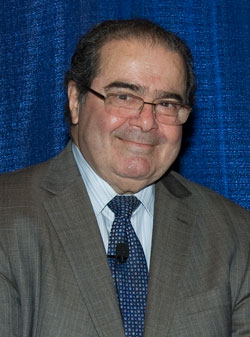Scalia: Most law schools will have to cut tuition; cutting faculty would 'be no huge disaster'
Justice Antonin Scalia doesn’t agree with proposals to cut law-school education from three to two years, but that doesn’t mean he opposes reform.
In a commencement speech to William & Mary law graduates earlier this month, Scalia said tuition will have to be cut at the “vast majority” of law schools. And that means some painful choices will have to be made. The Wall Street Journal Law Blog and Above the Law note Scalia’s speech (PDF), posted online last Thursday.
Scalia acknowledged that some areas of law can be practiced “without knowing much about the whole field. I expect that someone could be taught to be an expert real-estate conveyancer in six weeks, or a tax adviser in six months. And maybe we should train such people—but we should not call them lawyers.”

File photo of U.S. Supreme Court
Justice Antonin Scalia courtesy
of ABA Media Services.
But becoming a lawyer requires mastery of an increasingly complex body of law, Scalia said. He scoffed at the abundance of electives offered by law schools in place of a core curriculum. The choices, he said, foster the belief that law school can be completed in two years. “It is something of an open secret now,” he said, “that the second and third years of school offer a student the chance to study whatever strikes his or her fancy—so long as there is a professor who has the same fancy.”
The talk about a two-year degree has been spurred by the increasing cost of legal education, Scalia said. Tuition at Harvard Law School was $1,000 the year of Scalia’s graduation, he recalled. Today it is about $53,000. He quoted from an article by University of Colorado law professor Paul Campos finding that, in the last 60 years, tuition at Harvard Law School has increased tenfold in constant, inflation-adjusted dollars.
“But if law school is to remain three years,” Scalia continued, “costs have to be cut; the system is not sustainable in its present form. The graduation into a shrunken legal sector of students with hundreds of thousands of dollars of student debt, nondischargeable in bankruptcy, cannot continue. Perhaps—just perhaps—the more prestigious law schools (and I include William & Mary among them) can continue the way they are, though that is not certain. But the vast majority of law schools will have to lower tuition. That probably means smaller law-school faculties—though not necessarily one-third smaller. That would be no huge disaster.
“Harvard Law School, in the year I graduated, had a faculty of 56 professors, 9 teaching fellows, and 4 lecturers; it now has a faculty of 119 professors, 53 visiting professors, and 115 lecturers in law. A total of 69 then and 287 now.
“And last but not least, professorial salaries may have to be reduced, or at least stop rising. Again, not the end of the world. To use Harvard again as an example: Faculty salaries have much more than doubled in real terms since 1969.”



